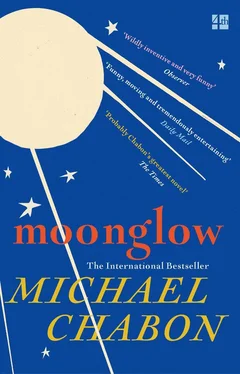“Unbelievable,” he said, aware that he was still smiling, and that he owed his brother five hundred bucks.
* * *
Where the carport roof overhung the patio my mother had set out a birdfeeder, a Lucite tube with an aluminum peg for a perch, packed with birdseed, dangling on a chain. My grandfather liked to keep an eye on the traffic through his window. He took particular interest in a squirrel he called “the momzer,” which came every day to raid the feeder. The momzer lacked grace, finesse, the power of flight. Once it had scattered the sparrows, it would approach the business end of the birdfeeder with a fierceness and a purpose whose futility amused my grandfather. The momzer was subject to gravity and the physics of a pendulum in ways a bird could not understand. It would begin with bold resolve, clambering down the chain from the overhang, hurling itself from a nearby trellis. But within seconds it would find itself clinging by its forepaws to the metal peg, or to the bottom of the tube, its tail madly switching, while the birdfeeder bucked and gyrated and worked to shake the momzer loose. As though he had yet to exorcise the demon that, decades ago, had urged him to drop a kitten out of a third-story window, my grandfather burst into laughter every time the squirrel fell, with a meaty thud, onto the flagstones of the patio. Sometimes he laughed so hard that I would have to take a Kleenex and wipe tears from his eyes.
“All those ladies in the Sisterhood, putting out their birdseed to catch a little chickadee,” my grandfather said. “But they caught a momzer instead.”
* * *
According to my grandfather, my grandmother’s first words to her future husband were: “Your head would look good on a fence.”
She had approached him with an unlit cigarette scissored between her index and middle fingers, one eyebrow, just visible over the rim of her sunglasses, arched in entreaty. My grandfather got the immediate sense, from the dumbshow and from something else—a lack of gaucherie in her girlishness—that she might be a foreigner. He lit her cigarette with Aughenbaugh’s lighter.
“Come again?” my grandfather said, the lighter’s flame stopped just short of the tip of his own cigarette. He replayed the remark in his mind. He decided he had heard her correctly, that she had indeed told him his head would look good on a fence. “How so?”
My grandfather had seen human heads discarded or reposed in unusual places, though never, it was true, on a fence. Nevertheless, he felt this was a conversational gambit he would not have thought to attempt. Because he could not see my grandmother’s eyes, he could not come to any solid conclusions about the spirit in which her observation had been offered. Only much later did he realize that in her weird way she had dispatched, with one stroke, the problem of making small talk with strangers.
“Oh, dear, I made a fault,” she said. “I see you take offense.”
“It’s my natural expression,” my grandfather said. “You’d look like this, too, if somebody stuck your head on a fence.”
“ Wall .” The word burst forth from her, followed by a startling heehaw of laughter. She clapped a hand over her mouth. “I am so sorry. I mean to say wall, not fence.”
“That changes everything,” my grandfather said. His approach to the art of flirtation with women was founded on an impeccable poker face.
“Wait,” she said, trying to hold back another of her braying laughs. “Have you ever seen a, how do you say, ca thee dral?”
With three sweeps of her white arms, she drew the walls, towers, and spires of a cathedral. She sketched with an efficiency of gesture that came as close as anything he remembered having seen to what poets and sportswriters liked to call grace. As her hands soared and dived, the coal of her cigarette shed glowing threads of tobacco. The orange sparks were reflected in the lenses of her cheaters. She finished by miming a rose window, encircling her fingers over her chest, a zone to which my grandfather’s attention had already been drawn. Brassieres of the era were architectural affairs; in her bust, with its loft and scale and defiance of gravity, there was something cathedral-like that moved him. Then he saw that in gun-colored ink on the inside of her left arm, she bore the recent history, in five digits, of her life, her family, and the world. He read its brief account and felt ashamed.
“Yeah,” he said. “I’ve seen some cathedrals.”
“On the walls,” she said. “The ancient walls.” She pronounced it hancient . “You see faces in the stone. That is the kind of the face you have.”
“Got it,” he said. “I look like a gargoyle.”
“Yes! No! Not a . . .” and she came out with the French word for gargoyle, which my grandfather after forty-two years could no longer retrieve. “Those are to catch the rain, and they are animals, monsters, they are ugly. That is not the kind of the face you have.”
That was at least partly a lie. To one of her psychiatrists, she later confessed that she did think he was ugly, albeit in a way she found appealing, even arousing. When she first saw him, standing at the threshold of the reception room, contemplating departure before he had even arrived, she thought he had an American face, an American body. Buick shoulders, bulldozer jaw. Only if you considered his eyes would you be forced to conclude, and she did conclude, that he was beautiful.
“I am the one who look like the gargoyle,” she said.
“Hardly.”
“Yes,” she said. “On the inside.”
He let that one pass without comment, taking it for prattle, compliment-fishing; his first misjudgment, his first encounter with the voice of the Skinless Horse, speaking through her.
“Can I ask you to do something?” he said. “Would you by any chance be willing to take off those glasses?”
She stood very still, red lips pressed together. He wondered if he had made some kind of gaffe, if asking a Frenchwoman to remove her sunglasses violated a well-known Gallic taboo.
“The eye doctor said I am not supposed to,” she said. Her voice faltered. “But I will.” This came out barely louder than a whisper.
“It’s all right,” he said. “Never mind. You can just tell me what color your eyes are. That’s all I really wanted to know.”
“No,” she said. “I will take them off for you. But also you have to do something for me. Let me to do something, I mean to say.”
“Yeah? And what’s that?”
I don’t know how many people could have seen my grandparents, standing there in the hallway outside the doors of the reception room, whether anyone was paying any attention. But even if they had been standing in an empty room, I imagine that neither my grandfather nor the mores of 1947 can have expected my grandmother to do what she did next. Looking back at that night from inside the soft gray nimbus of Dilaudid, my grandfather could only close his eyes, the way he closed them that night, as she reached out to the fly of his trousers and, tooth by tooth, zipped him up.
“ C’est fait, ” she said.
When he opened his eyes, he found himself lost for the first time in hers. They were the color of twilight in Monte Carlo, when the stars come out to twinkle like ten-watt bulbs, and the quarter-moon fans her hem of sequins against the sky.
“Blue,” my grandfather said, falling back against the pillow of the rented hospital bed in my mother’s guest room. After that it was a long time, hours, before he opened his eyes again.
Just before midnight of September 29, 1989, my grandfather completed the model of LAV One. It represented the latest thinking on lunar settlement design (the reason it had needed so many revisions), fourteen years’ work, and about twenty-two thousand individual polystyrene pieces cannibalized from commercial model kits.* At the center of the model, amid the half-buried tunnels, bays, domes, huts, landing strips, and radar arrays, there was a hole about four inches in diameter. Looking down into this hole, you could see through to the plywood substructure of the model’s molded lunar surface. If you asked my grandfather the purpose of the hole, he would always give you some variation on You ’ll just have to wait and find out ; to be honest, there was not a lot of variation. After a while—no doubt according to his plan—I stopped asking.
Читать дальше












